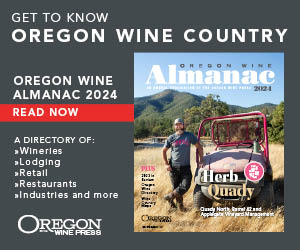Event Bill Battle
By Karl Klooster
A heated battle between bureaucratic control and free enterprise flexibility has played out over the last few months. The opponents, if you will, are state and county officialdom on one side and Oregon wineries on the other.
The issue, which centered on non-traditional use of agricultural land, raised the question of negative environmental impact. In this regard, 1000 Friends of Oregon expressed adamant opposition.
The Association of Oregon Counties also came down on the negative side, undoubtedly because state regulation would supersede local authority, thus reducing control over activities within their boundaries.
As a consequence, what could have been a relatively straightforward process turned into a quite complex and contentious one. Finally, a much-amended and modified measure, House Bill 3280, was passed by the state legislature on June 27.
House members voted an overwhelming 48–10 in favor. In the Senate, there were only three votes against.
For years, wineries around the state have staged public events of varying sizes, some with food and/or entertainment and some without. A number installed kitchens and prepared fancy wine dinners or hired caterers to do it for them.
Acquiring permits and complying with regulations was something that had to be pursued on a county-by-county basis.
In that regard, some counties have been quite cooperative, working with wineries to achieve mutually acceptable results. Others have thrown up bureaucratic roadblocks, giving rise to discontent among wineries under their jurisdiction, whose owners knew full well counterparts elsewhere were being allowed to move forward with the same sort of activities.
The often-arbitrary disparities cried out for a uniform set of regulations statewide. That process got under way in earnest with this year’s biennial legislative session in Salem.
Senate Bill 960, introduced on March 17, 2011, was principally designed to clarify non-agricultural uses of farmland or deviations from the same. Its single section applying to wineries addressed only the state’s largest producers.
SB 960 contained a “grandfather” clause allowing King Estate’s on-site restaurant to remain open and Willamette Valley Vineyards’ numerous events during the year to continue. It passed in the House, June 2 and the Senate on June 17.
However, 960 did not address what smaller wineries could and could not do in regard to sales and services in exclusive farm-use zones. HB 3280, introduced on Feb. 16, 2011, was designed to do that.
Tim Ramey, owner of Zenith Vineyard in the Eola-Amity Hills, summarized the benefits of HB 3280 for the industry this way:
“First, there is a very strong grandfather clause,” Ramey said. “If you were doing something legally before the date of this bill, it will remain legal. If you were doing events legally, you will still be allowed to do events without limit, not subject even to the 25 percent income test.
“You will be capped at 25 events per year. Your non-wine revenue will be capped at 25 percent of your on-site retail revenue.”
The final version, though seen as a compromise by the wine industry, was also considered the best possible result under the circumstances.
Ramey also expressed puzzlement at 1000 Friends opposition, given the Oregon wine industry’s track record in regard to the environment.
“We are the greenest industry around,” he said. “No one is more committed to sustainability and low impact practices.”
He noted events that have been going on for years at wineries located in EFU zones, and with essentially no problems. He said market demand would determine the amount, if any, of increased activity.
Perhaps the most telling aspect of HB 3280’s hectic evolution is the fact that it is set to sunset in just two years. This will give everyone involved the ability to revisit the issue after gaining some additional real world perspective.







